Understanding Organizational Culture: A Comparative Report (MGNT803)
VerifiedAdded on 2022/10/01
|6
|1245
|15
Report
AI Summary
This report analyzes two journal articles focusing on organizational culture and its impact on leadership and human resource management. The first article, by Warrick (2017), emphasizes the crucial role of organizational culture in a company's success, highlighting its influence on employee effectiveness, productivity, and talent retention, particularly from a leadership perspective. The article underscores the importance of leaders understanding and shaping cultural development to align organizational strategies with cultural ideals. The second article, by Chitrakar (2017), examines the role of human resource management in establishing and maintaining organizational culture, especially in diverse work environments. It explores how HR departments implement strategies to achieve organizational goals and ensure employees understand the company's structure. The report compares these two perspectives, noting Warrick's focus on leadership's responsibility in understanding and utilizing organizational culture, while Chitrakar emphasizes the HR department's role in creating and maintaining a healthy work environment. The conclusion stresses the importance of aligning organizational behavior and culture with company policies for smooth workflows and employee success.
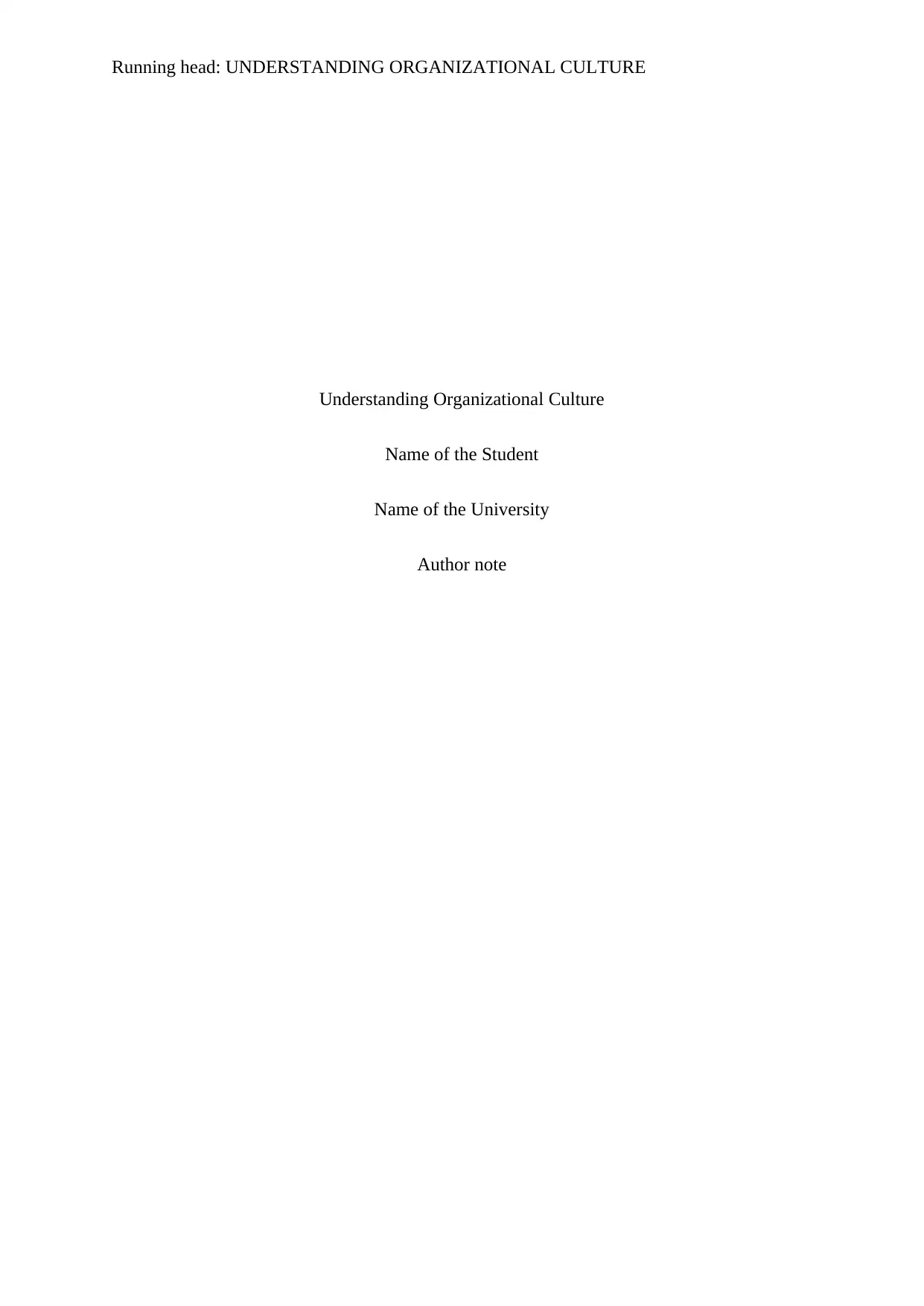
Running head: UNDERSTANDING ORGANIZATIONAL CULTURE
Understanding Organizational Culture
Name of the Student
Name of the University
Author note
Understanding Organizational Culture
Name of the Student
Name of the University
Author note
Paraphrase This Document
Need a fresh take? Get an instant paraphrase of this document with our AI Paraphraser
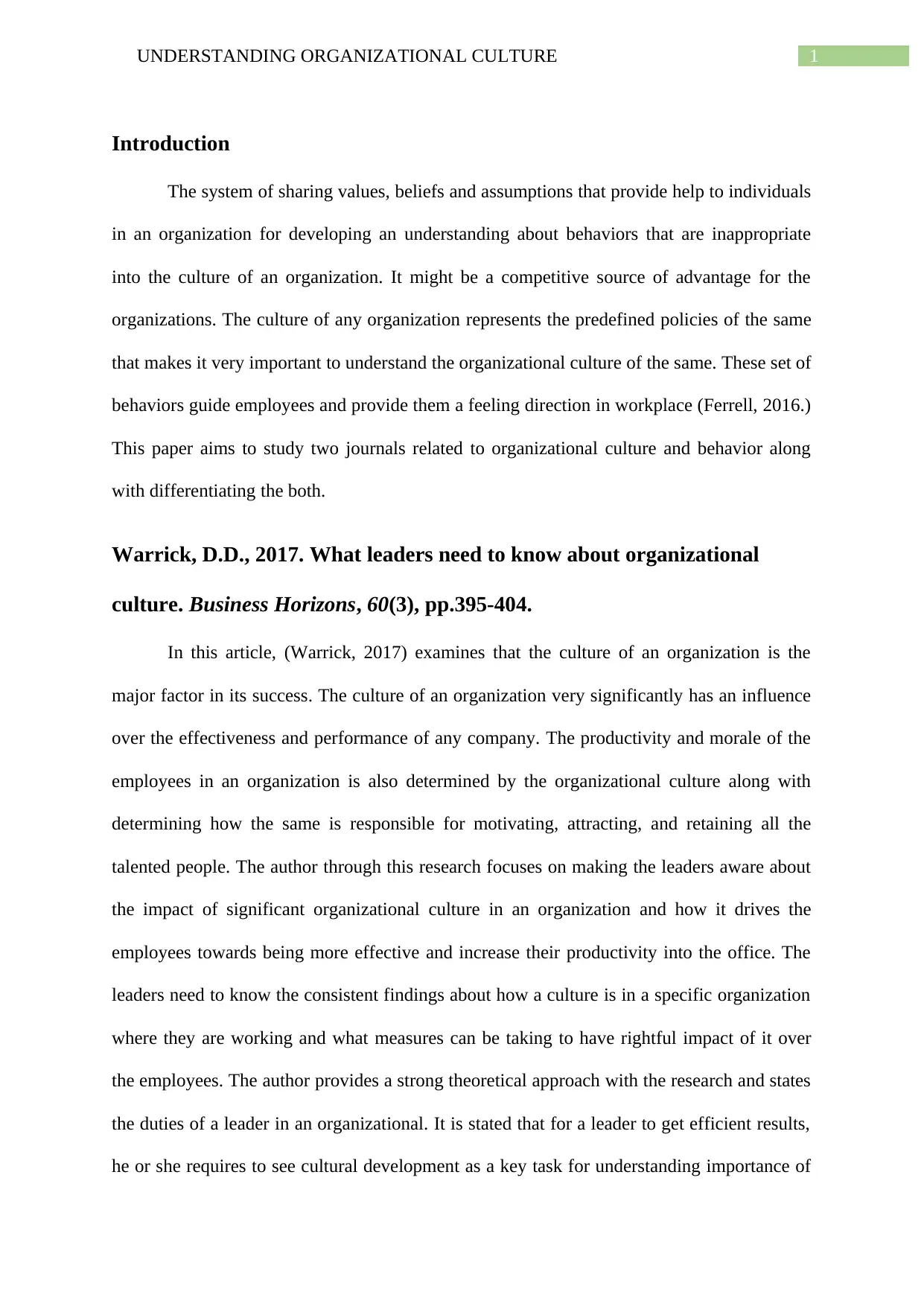
1UNDERSTANDING ORGANIZATIONAL CULTURE
Introduction
The system of sharing values, beliefs and assumptions that provide help to individuals
in an organization for developing an understanding about behaviors that are inappropriate
into the culture of an organization. It might be a competitive source of advantage for the
organizations. The culture of any organization represents the predefined policies of the same
that makes it very important to understand the organizational culture of the same. These set of
behaviors guide employees and provide them a feeling direction in workplace (Ferrell, 2016.)
This paper aims to study two journals related to organizational culture and behavior along
with differentiating the both.
Warrick, D.D., 2017. What leaders need to know about organizational
culture. Business Horizons, 60(3), pp.395-404.
In this article, (Warrick, 2017) examines that the culture of an organization is the
major factor in its success. The culture of an organization very significantly has an influence
over the effectiveness and performance of any company. The productivity and morale of the
employees in an organization is also determined by the organizational culture along with
determining how the same is responsible for motivating, attracting, and retaining all the
talented people. The author through this research focuses on making the leaders aware about
the impact of significant organizational culture in an organization and how it drives the
employees towards being more effective and increase their productivity into the office. The
leaders need to know the consistent findings about how a culture is in a specific organization
where they are working and what measures can be taking to have rightful impact of it over
the employees. The author provides a strong theoretical approach with the research and states
the duties of a leader in an organizational. It is stated that for a leader to get efficient results,
he or she requires to see cultural development as a key task for understanding importance of
Introduction
The system of sharing values, beliefs and assumptions that provide help to individuals
in an organization for developing an understanding about behaviors that are inappropriate
into the culture of an organization. It might be a competitive source of advantage for the
organizations. The culture of any organization represents the predefined policies of the same
that makes it very important to understand the organizational culture of the same. These set of
behaviors guide employees and provide them a feeling direction in workplace (Ferrell, 2016.)
This paper aims to study two journals related to organizational culture and behavior along
with differentiating the both.
Warrick, D.D., 2017. What leaders need to know about organizational
culture. Business Horizons, 60(3), pp.395-404.
In this article, (Warrick, 2017) examines that the culture of an organization is the
major factor in its success. The culture of an organization very significantly has an influence
over the effectiveness and performance of any company. The productivity and morale of the
employees in an organization is also determined by the organizational culture along with
determining how the same is responsible for motivating, attracting, and retaining all the
talented people. The author through this research focuses on making the leaders aware about
the impact of significant organizational culture in an organization and how it drives the
employees towards being more effective and increase their productivity into the office. The
leaders need to know the consistent findings about how a culture is in a specific organization
where they are working and what measures can be taking to have rightful impact of it over
the employees. The author provides a strong theoretical approach with the research and states
the duties of a leader in an organizational. It is stated that for a leader to get efficient results,
he or she requires to see cultural development as a key task for understanding importance of
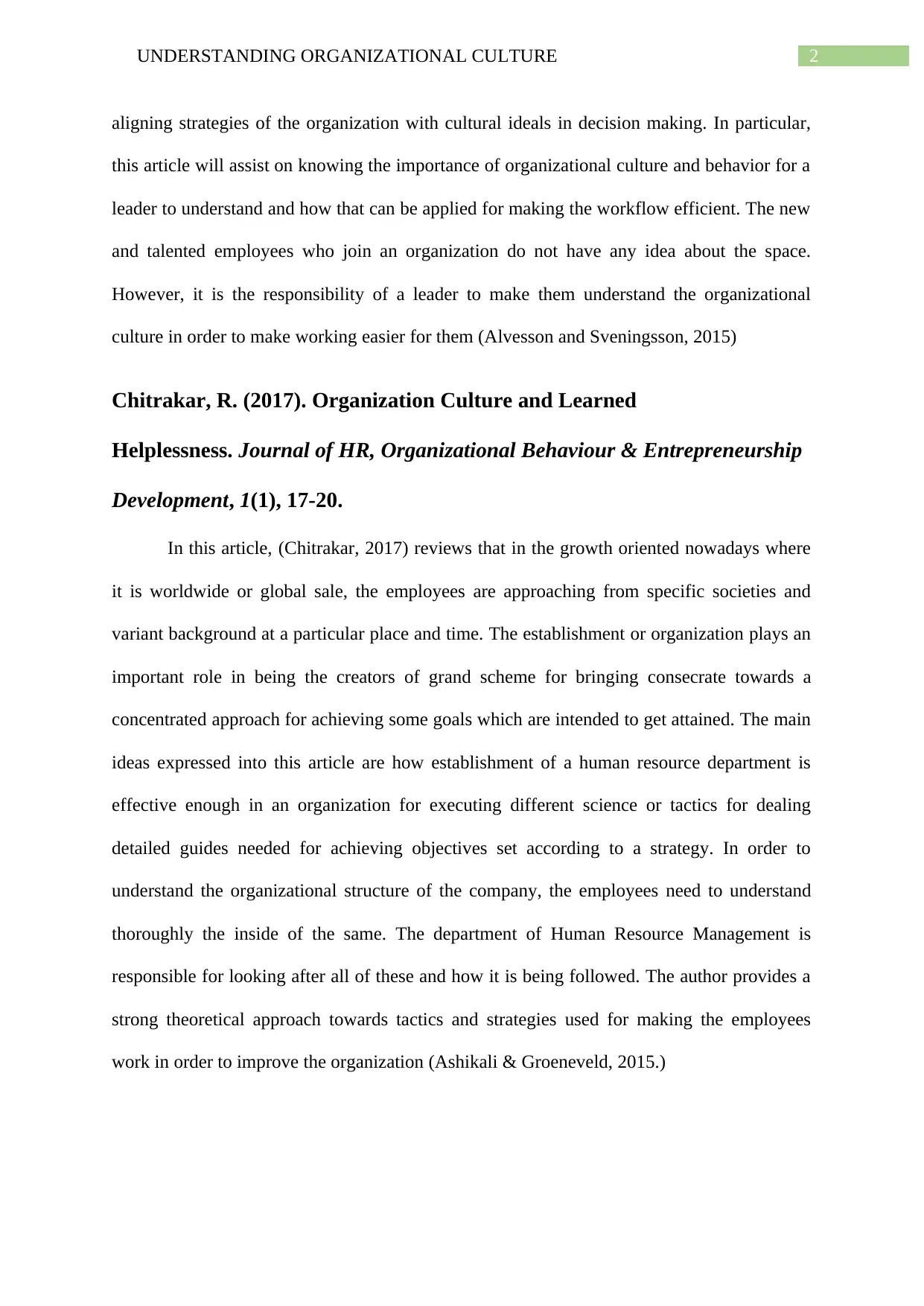
2UNDERSTANDING ORGANIZATIONAL CULTURE
aligning strategies of the organization with cultural ideals in decision making. In particular,
this article will assist on knowing the importance of organizational culture and behavior for a
leader to understand and how that can be applied for making the workflow efficient. The new
and talented employees who join an organization do not have any idea about the space.
However, it is the responsibility of a leader to make them understand the organizational
culture in order to make working easier for them (Alvesson and Sveningsson, 2015)
Chitrakar, R. (2017). Organization Culture and Learned
Helplessness. Journal of HR, Organizational Behaviour & Entrepreneurship
Development, 1(1), 17-20.
In this article, (Chitrakar, 2017) reviews that in the growth oriented nowadays where
it is worldwide or global sale, the employees are approaching from specific societies and
variant background at a particular place and time. The establishment or organization plays an
important role in being the creators of grand scheme for bringing consecrate towards a
concentrated approach for achieving some goals which are intended to get attained. The main
ideas expressed into this article are how establishment of a human resource department is
effective enough in an organization for executing different science or tactics for dealing
detailed guides needed for achieving objectives set according to a strategy. In order to
understand the organizational structure of the company, the employees need to understand
thoroughly the inside of the same. The department of Human Resource Management is
responsible for looking after all of these and how it is being followed. The author provides a
strong theoretical approach towards tactics and strategies used for making the employees
work in order to improve the organization (Ashikali & Groeneveld, 2015.)
aligning strategies of the organization with cultural ideals in decision making. In particular,
this article will assist on knowing the importance of organizational culture and behavior for a
leader to understand and how that can be applied for making the workflow efficient. The new
and talented employees who join an organization do not have any idea about the space.
However, it is the responsibility of a leader to make them understand the organizational
culture in order to make working easier for them (Alvesson and Sveningsson, 2015)
Chitrakar, R. (2017). Organization Culture and Learned
Helplessness. Journal of HR, Organizational Behaviour & Entrepreneurship
Development, 1(1), 17-20.
In this article, (Chitrakar, 2017) reviews that in the growth oriented nowadays where
it is worldwide or global sale, the employees are approaching from specific societies and
variant background at a particular place and time. The establishment or organization plays an
important role in being the creators of grand scheme for bringing consecrate towards a
concentrated approach for achieving some goals which are intended to get attained. The main
ideas expressed into this article are how establishment of a human resource department is
effective enough in an organization for executing different science or tactics for dealing
detailed guides needed for achieving objectives set according to a strategy. In order to
understand the organizational structure of the company, the employees need to understand
thoroughly the inside of the same. The department of Human Resource Management is
responsible for looking after all of these and how it is being followed. The author provides a
strong theoretical approach towards tactics and strategies used for making the employees
work in order to improve the organization (Ashikali & Groeneveld, 2015.)
⊘ This is a preview!⊘
Do you want full access?
Subscribe today to unlock all pages.

Trusted by 1+ million students worldwide
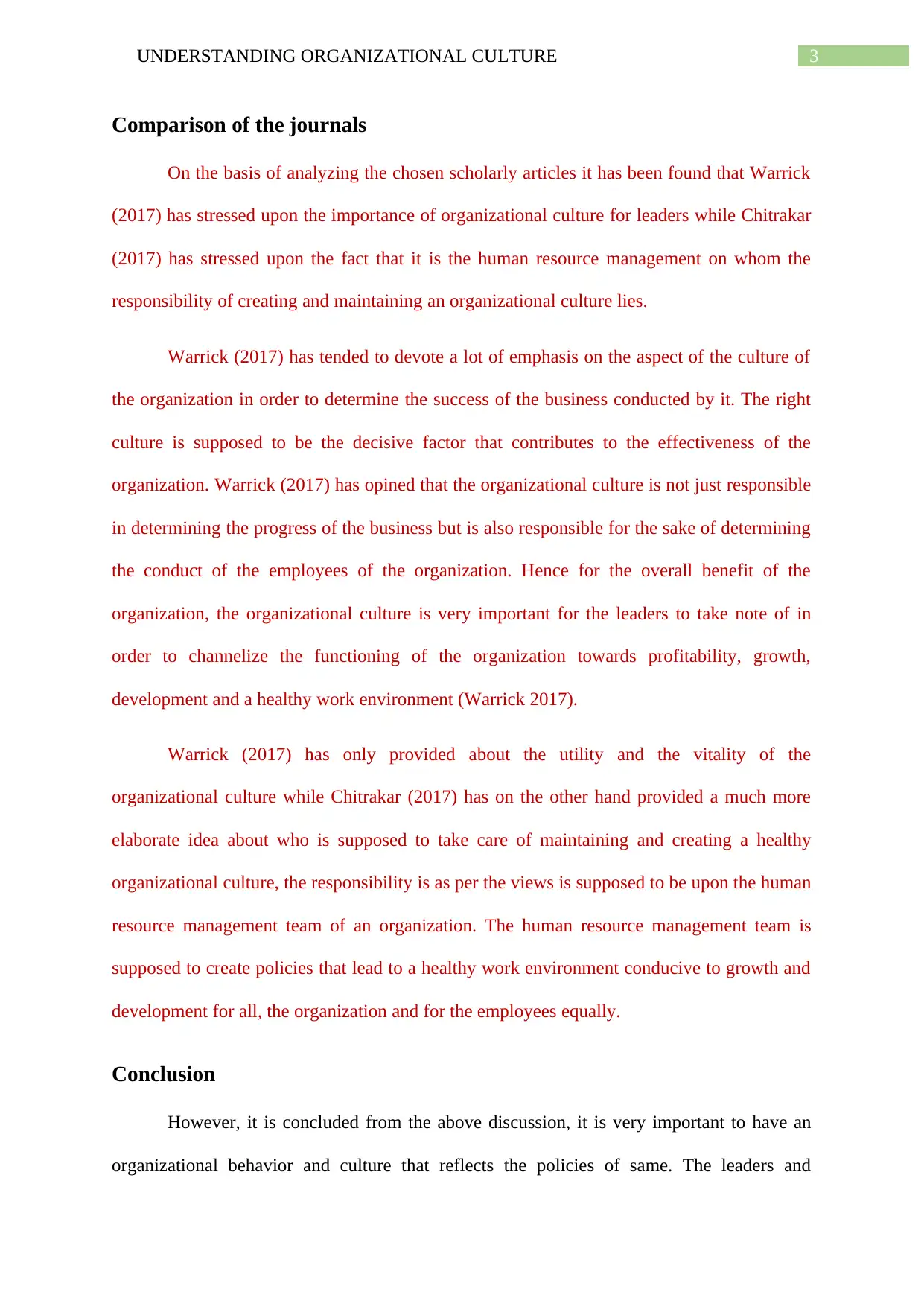
3UNDERSTANDING ORGANIZATIONAL CULTURE
Comparison of the journals
On the basis of analyzing the chosen scholarly articles it has been found that Warrick
(2017) has stressed upon the importance of organizational culture for leaders while Chitrakar
(2017) has stressed upon the fact that it is the human resource management on whom the
responsibility of creating and maintaining an organizational culture lies.
Warrick (2017) has tended to devote a lot of emphasis on the aspect of the culture of
the organization in order to determine the success of the business conducted by it. The right
culture is supposed to be the decisive factor that contributes to the effectiveness of the
organization. Warrick (2017) has opined that the organizational culture is not just responsible
in determining the progress of the business but is also responsible for the sake of determining
the conduct of the employees of the organization. Hence for the overall benefit of the
organization, the organizational culture is very important for the leaders to take note of in
order to channelize the functioning of the organization towards profitability, growth,
development and a healthy work environment (Warrick 2017).
Warrick (2017) has only provided about the utility and the vitality of the
organizational culture while Chitrakar (2017) has on the other hand provided a much more
elaborate idea about who is supposed to take care of maintaining and creating a healthy
organizational culture, the responsibility is as per the views is supposed to be upon the human
resource management team of an organization. The human resource management team is
supposed to create policies that lead to a healthy work environment conducive to growth and
development for all, the organization and for the employees equally.
Conclusion
However, it is concluded from the above discussion, it is very important to have an
organizational behavior and culture that reflects the policies of same. The leaders and
Comparison of the journals
On the basis of analyzing the chosen scholarly articles it has been found that Warrick
(2017) has stressed upon the importance of organizational culture for leaders while Chitrakar
(2017) has stressed upon the fact that it is the human resource management on whom the
responsibility of creating and maintaining an organizational culture lies.
Warrick (2017) has tended to devote a lot of emphasis on the aspect of the culture of
the organization in order to determine the success of the business conducted by it. The right
culture is supposed to be the decisive factor that contributes to the effectiveness of the
organization. Warrick (2017) has opined that the organizational culture is not just responsible
in determining the progress of the business but is also responsible for the sake of determining
the conduct of the employees of the organization. Hence for the overall benefit of the
organization, the organizational culture is very important for the leaders to take note of in
order to channelize the functioning of the organization towards profitability, growth,
development and a healthy work environment (Warrick 2017).
Warrick (2017) has only provided about the utility and the vitality of the
organizational culture while Chitrakar (2017) has on the other hand provided a much more
elaborate idea about who is supposed to take care of maintaining and creating a healthy
organizational culture, the responsibility is as per the views is supposed to be upon the human
resource management team of an organization. The human resource management team is
supposed to create policies that lead to a healthy work environment conducive to growth and
development for all, the organization and for the employees equally.
Conclusion
However, it is concluded from the above discussion, it is very important to have an
organizational behavior and culture that reflects the policies of same. The leaders and
Paraphrase This Document
Need a fresh take? Get an instant paraphrase of this document with our AI Paraphraser
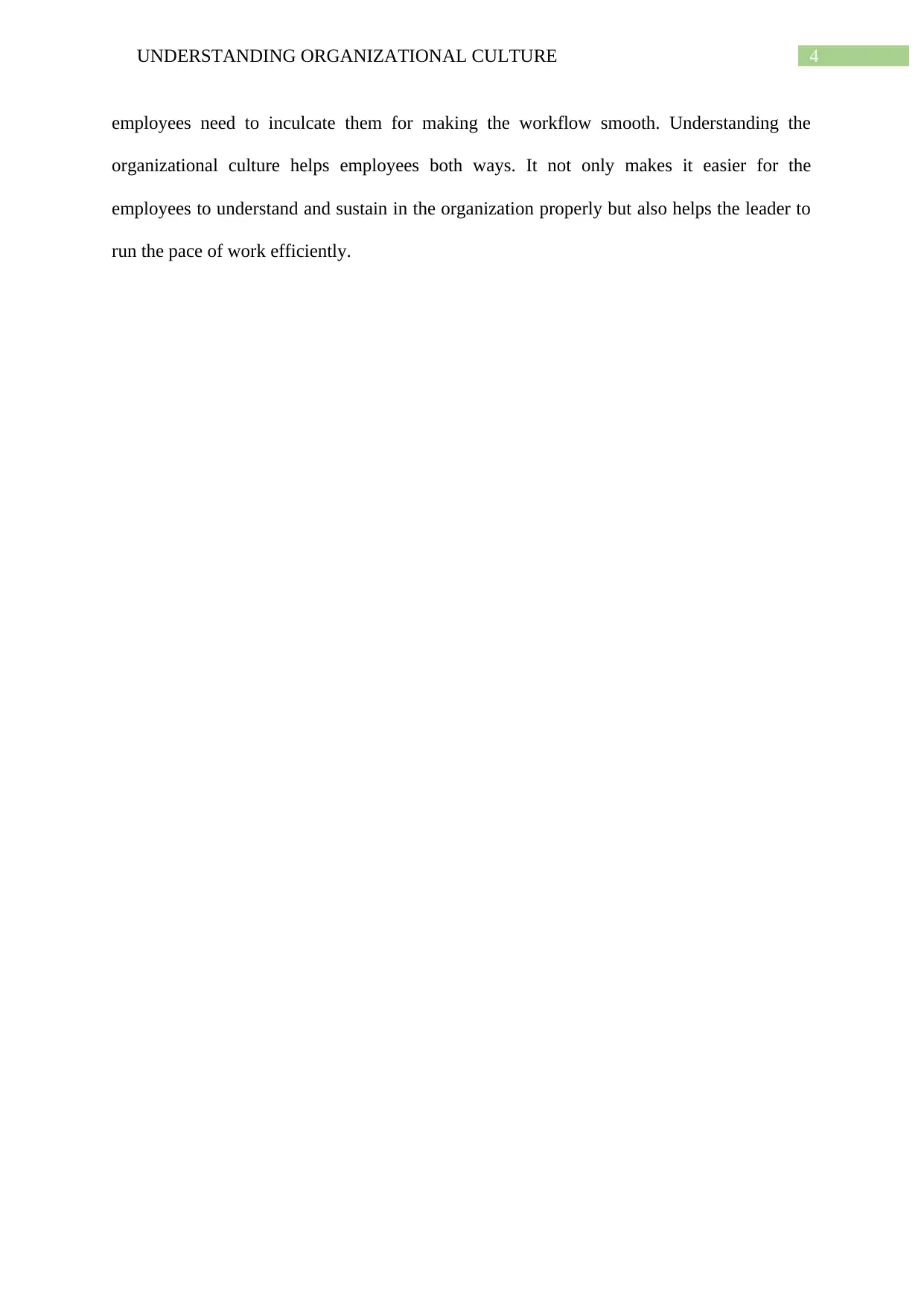
4UNDERSTANDING ORGANIZATIONAL CULTURE
employees need to inculcate them for making the workflow smooth. Understanding the
organizational culture helps employees both ways. It not only makes it easier for the
employees to understand and sustain in the organization properly but also helps the leader to
run the pace of work efficiently.
employees need to inculcate them for making the workflow smooth. Understanding the
organizational culture helps employees both ways. It not only makes it easier for the
employees to understand and sustain in the organization properly but also helps the leader to
run the pace of work efficiently.
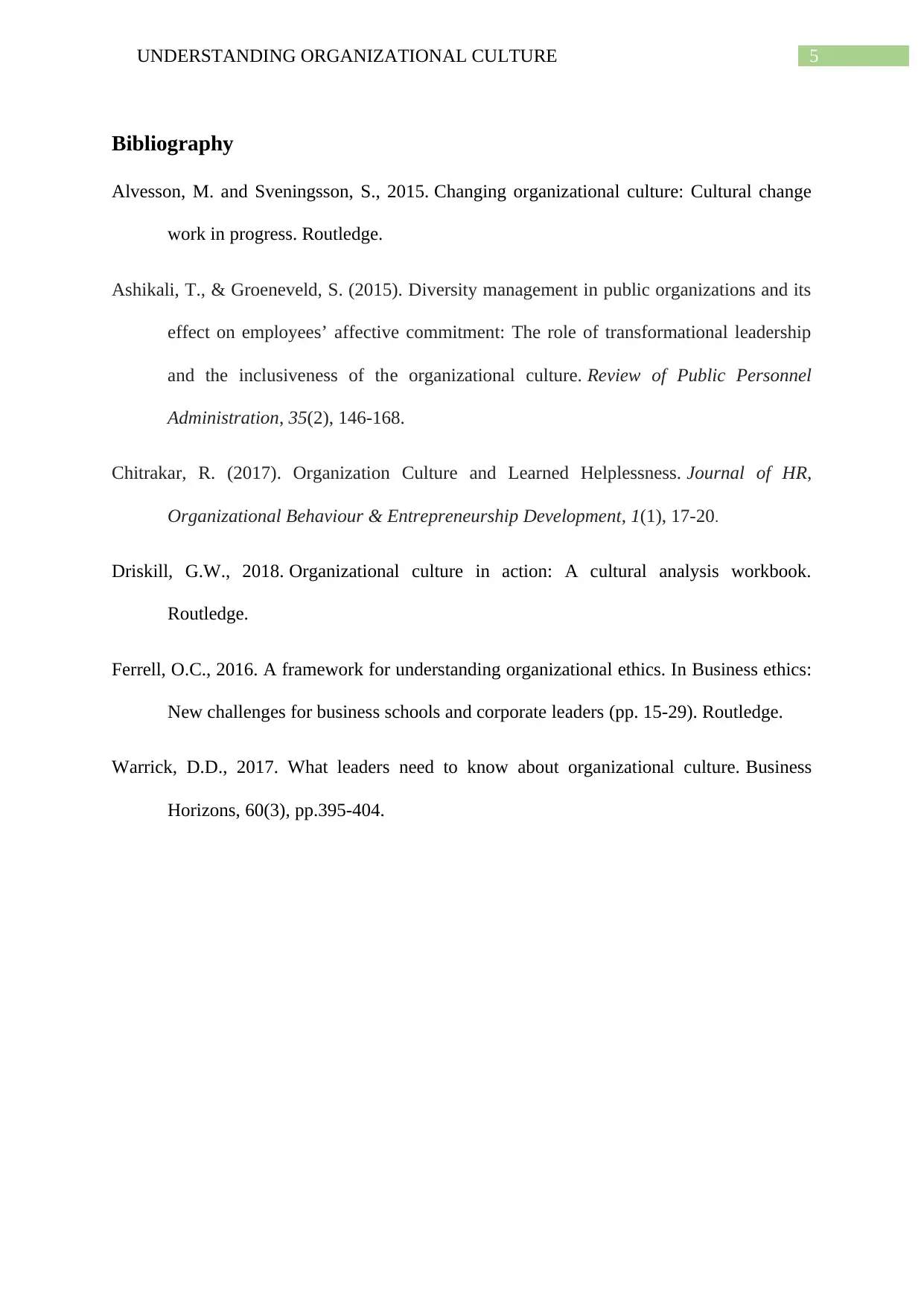
5UNDERSTANDING ORGANIZATIONAL CULTURE
Bibliography
Alvesson, M. and Sveningsson, S., 2015. Changing organizational culture: Cultural change
work in progress. Routledge.
Ashikali, T., & Groeneveld, S. (2015). Diversity management in public organizations and its
effect on employees’ affective commitment: The role of transformational leadership
and the inclusiveness of the organizational culture. Review of Public Personnel
Administration, 35(2), 146-168.
Chitrakar, R. (2017). Organization Culture and Learned Helplessness. Journal of HR,
Organizational Behaviour & Entrepreneurship Development, 1(1), 17-20.
Driskill, G.W., 2018. Organizational culture in action: A cultural analysis workbook.
Routledge.
Ferrell, O.C., 2016. A framework for understanding organizational ethics. In Business ethics:
New challenges for business schools and corporate leaders (pp. 15-29). Routledge.
Warrick, D.D., 2017. What leaders need to know about organizational culture. Business
Horizons, 60(3), pp.395-404.
Bibliography
Alvesson, M. and Sveningsson, S., 2015. Changing organizational culture: Cultural change
work in progress. Routledge.
Ashikali, T., & Groeneveld, S. (2015). Diversity management in public organizations and its
effect on employees’ affective commitment: The role of transformational leadership
and the inclusiveness of the organizational culture. Review of Public Personnel
Administration, 35(2), 146-168.
Chitrakar, R. (2017). Organization Culture and Learned Helplessness. Journal of HR,
Organizational Behaviour & Entrepreneurship Development, 1(1), 17-20.
Driskill, G.W., 2018. Organizational culture in action: A cultural analysis workbook.
Routledge.
Ferrell, O.C., 2016. A framework for understanding organizational ethics. In Business ethics:
New challenges for business schools and corporate leaders (pp. 15-29). Routledge.
Warrick, D.D., 2017. What leaders need to know about organizational culture. Business
Horizons, 60(3), pp.395-404.
⊘ This is a preview!⊘
Do you want full access?
Subscribe today to unlock all pages.

Trusted by 1+ million students worldwide
1 out of 6
Related Documents
Your All-in-One AI-Powered Toolkit for Academic Success.
+13062052269
info@desklib.com
Available 24*7 on WhatsApp / Email
![[object Object]](/_next/static/media/star-bottom.7253800d.svg)
Unlock your academic potential
Copyright © 2020–2026 A2Z Services. All Rights Reserved. Developed and managed by ZUCOL.




